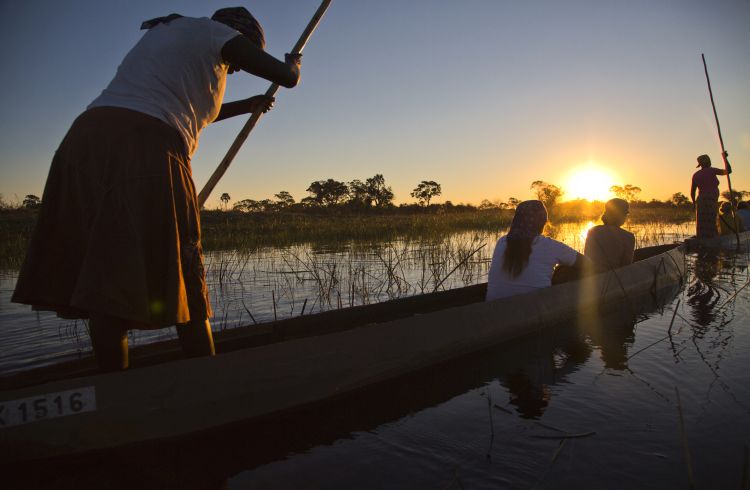How to Stay Healthy While Traveling Around Botswana
There is a lack of access to medical care and help if you get injured or fall ill in Botswana – here's what you need to know before you go.
 Photo © Getty Images/Harri Jarvelainen Photography
Photo © Getty Images/Harri Jarvelainen Photography
- Vaccinations for Botswana
- Medical Treatment in Botswana
- Mosquito Borne Disease
- Other Insect Borne Disease
- Food and Water Borne Disease
Vaccinations for Botswana
Travelers need to make sure their routine vaccinations are up to date and it's a good idea to get the following for your trip to Botswana:
- Hepatitis A
- Typhoid
- Rabies (recommended for travelers who are planning to spend extended periods in rural and remote locations)
Travelers who enter Botswana from countries where Ebola is present will likely be screened and travelers who have arrived from a yellow fever endemic country will also need to provide proof of vaccination.
Medical treatment in Botswana
Botswana has a reasonably good standard of medical treatment available in the major urban centers including private hospitals. Public hospitals tend to have a lower standard due to lack of funding and overcrowding. As you would expect in more rural locations, medical facilities are rare or non-existent.
Should you need to take any medications while you travel, it's best to bring what you need from home for the entire trip along with a doctor's letter outlining their use and dosage etc.
If you plan to travel out of the urban areas, it's a good idea to take a first aid kit with you.
Mosquito-borne disease
Malaria can occur throughout Botswana and is prevalent in the North of the country, especially during the rainy season (November to March).
Malaria cases tend to increase near populated areas, but there is still some risk in more isolated spots and north of the capital, Gaborone. See a travel doctor before you go and grab some malaria prophylaxis.
Aside from medication, covering up is important. Check your lodge or tent for mosquitoes and always use a mosquito net. If your lodge has a ceiling fan, sleep with that on.
Apply insect repellent and wear loose light, long sleeved clothing.
Other insect-borne disease
African sleeping sickness
African sleeping sickness is present in Botswana. It's an infection with a parasite carried by the Tsetse fly.
When an infected fly bites you, the infection spreads through your circulatory system and can it result in swelling of the brain. Symptoms include headaches, skin irritation, fever and joint pain, with advanced cases exhibiting disorientation, incoordination and change in behavior
You will know when a tsetse fly bites you - its like a painful sting. They are attracted to dark clothing, so wear light, long sleeved clothing and apply insect repellent.
African tick-bite fever
If you intend to camp or walk in the bush you should be aware of the risk of tick bites.
African Tick-Bite Fever is present throughout Botswana particularly in the eastern part of the country. It's an bacterial infection spread by tick bite. Symptoms are similar to many other conditions such as headache, fever, rash and muscle pain. It's important you seek medical treatment immediately to ensure you are treated properly. African Tick-Bite Fever requires antibiotics to eradicate it.
Avoid being bitten by sticking to well worn tracks where possible, tucking your pants into your socks, wearing a DEET based repellent and wearing long, light-colored long sleeved clothing. Don't forget to check yourself over when you get back to your accommodation and check your bag etc.
Food and water-borne disease
Water borne and food borne diseases such as cholera, typhoid, hepatitis A and gastro bugs are prevalent in Botswana, with more serious outbreaks occurring from time to time.
Make sure all water has been purified before consumption, avoid ice cubes plus raw and undercooked food. Observing good personal hygiene practises can also help you avoid spending your trip laid up in hospital or bed.
Tuberculosis
Tuberculosis (TB) has been identified in Botswana. The disease is transmitted by sneezing, coughing and also unpasteurized dairy products such as milk. The symptoms of TB are similar to respiratory infections such as bronchitis, influenza and pheumonia so it's vital you seek medical treatment urgently as TB can be fatal.
Schistosomiasis
Avoid swimming in fresh water to avoid exposure to certain water-borne diseases such as Schistosomiasis.
Schistosomiasis is a human disease caused by parasitic worms called Schistosomes. Symptoms are similar to African Sleeping Sickness plus throw in chills, coughing and stomach pain. Seek medical treatment as quickly as possible. If treated early, the infection can clear in a few days.
Over one billion people are at risk worldwide and ~300 million are infected. Schistosomiasis is common in the tropics where ponds, streams and irrigation canals harbor schistosomiasis-transmitting snails. Parasite larvae develop in snails from which they infect humans, in which they mature and reproduce.
Related articles
Simple and flexible travel insurance
You can buy at home or while traveling, and claim online from anywhere in the world. With 150+ adventure activities covered and 24/7 emergency assistance.
Get a quote
No Comments